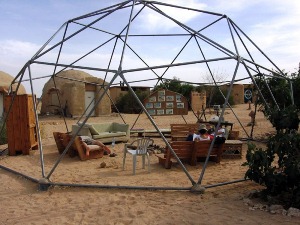
While kibbutzim (plural for kibbutz) may seem like a relic of the old Israel, there are still hundreds of them today, transformed and sometimes pioneering new forms of community. While they are not the living off the land in the old style of growing cotton and bananas, they are using the land for the greater good. Some of them have put their communal work ethic to use in technology or bioscience, or focusing on encouraging good environmental stewardship of the land. Interestingly, some of the most environmentally focused kibbutzim are affiliated with Reform Judaism. Their environmental awareness is combined with the tradition of agricultural production.
At Kibbutz Yahel, the first kibbutz founded by the Progressive (Reform) movement, young volunteers from around the world are invited to participate in the harvesting of melons, pomelos, peppers and spring onions between May and September. The kibbutz is situated in the Arava in the Negev desert in Southern Israel, making it the perfect place to see firsthand how Israel made the desert bloom. Yahel is currently working with the Jewish National Fund to create a park dedicated to water conservation and development. Visitors can relax near a reservoir surrounded by date palms and experience the desert in a whole new way.
Principles of Reform Judaism are woven into everyday life at Kibbutz Lotan, which currently serves as a popular eco-tourism spot. Yet another kibbutz in the Negev desert, it houses one of Israel's largest environmental education centers. Lotan offers an intensive 6-week work/study experience focused on the design, building and running of sustainable communities, called the Green Apprenticeship. Of course, the kibbutz itself is environmentally sustainable as well.
Kibbutz Ketura was founded by a group of young American olim (immigrants to Israel) and is still a haven for olim from around the world today, many of them from the pluralistic Young Judea movement and many of whom are active members of the Reform Movement in Israel. The kibbutz is known for its religious pluralism and tolerance, as well as its world-famous Arava Institute for Environmental Studies, which promotes regional environmental cooperation Israelis, Palestinians and Jordanians. Due to their ingenuity, today this is a kibbutz of millionaires since two of their companies - Arava Power, a solar-power company; and Algatechnologies, a biotech company focused on fighting the effects of aging - have been bought for millions by Siemens and Grovepoint Capital, respectively (learn more).
Religious pluralism and environmentalism seem to go hand in hand on Israeli kibbutzim, which can be attributed to Reform Judaism's dedication to respecting the environment and keeping the earth clean and healthy for the next generation.

